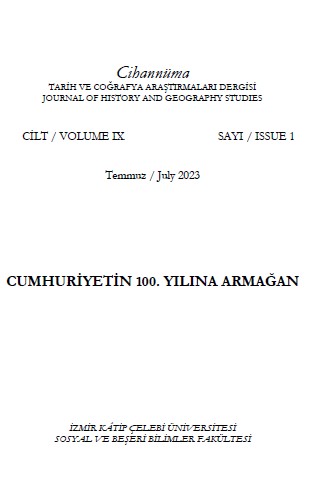SİYASAL KİMLİKLİ AYDINLARIN DİL DEVRİMİ’NE ETKİSİ (1932-1952)
THE INFLUENCE OF THE INTELLECTUALS WITH POLITICAL IDENTITY ON THE LANGUAGE REVOLUTION (1932-1952)
Author(s): Murat Fikrettin TuranSubject(s): Political history, Government/Political systems, History of Education, State/Government and Education, Interwar Period (1920 - 1939), WW II and following years (1940 - 1949), Post-War period (1950 - 1989), Politics and Identity, Turkic languages
Published by: İzmir Kâtip Çelebi Üniversitesi, Sosyal ve Beşeri Bilimler Fakültesi
Keywords: Language Revolution; Turkish Modernization; Republican People's Party; Democrat Party; Turkish Grand National Assembly; Republic of Turkey;
Summary/Abstract: Intellectuals with political identity played a leading role in the modernization process of Turkey. Such groups have been influential in terms of transforming the society and ensuring that the movement is permanent. Language studies, one of the most significant activities of the Republican period, is an initiative that has been accomplished through the efforts of the aforementioned group of intellectuals. Intellectuals who participated actively in the language studies were also experts in the fields of education, language and literature since the last period of the Ottoman Empire. They utilized the knowledge which they acquired through their experiences and observations for the completing Language Revolution successfully. It has been figured out that in the Republican era, the inclusion of intellectuals holding positions in the administrative levels and institutions of the state in language studies was based on professional merit. The majority of the intellectuals who took part in language studies were people who worked in institutions affiliated to the Board of Education, worked as an author and translator in newspapers and magazines, and had their works published on Turkish grammar and Turkish literature. Said people were authorized in various manners to participate in language studies, by considering their knowledge, experience and abilities. While the intellectuals were authorized initially for the establishment of the Language Council in 1928 initially, they were authorized for the adoption of the decision to switch to Latin letters by the Assembly subsequently. With the establishment of the Türk Dili Tetkik Cemiyeti (Society for Examination of Turkish Language) in 1932, language activities were expanded to cover all areas of politics. Language studies was a movement executed by the state and institutionalized particularly under the leadership of Mustafa Kemal Atatürk and other intellectuals with political identity. Such initiatives, initiated by the authors having knowledge on the structure of language and its cultural development, naturally determined the nature of the debates in the Assembly. As a result of the findings obtained mainly from the minutes of the Turkish Grand National Assembly and the sources of the Language Conventions, the influence of the intellectuals with political identity on the Language Revolution has been examined in this study.
Journal: Cihannüma: Tarih ve Coğrafya Araştırmaları Dergisi
- Issue Year: IX/2023
- Issue No: 1
- Page Range: 145-174
- Page Count: 30
- Language: Turkish

